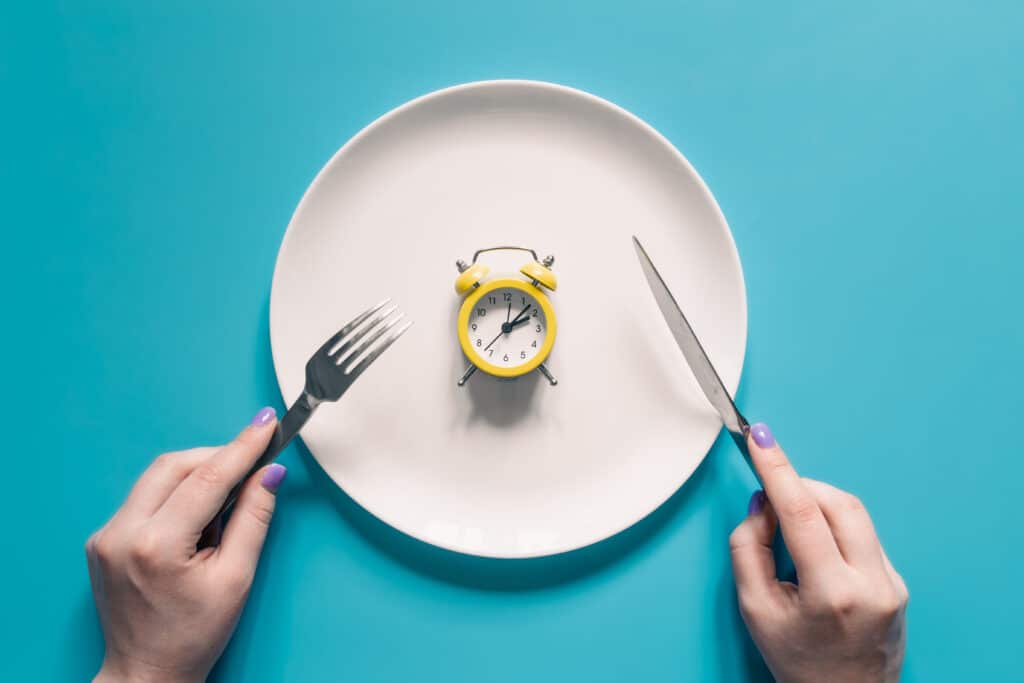Is it better to eat several small meals or fewer larger ones? Should I eat every couple of hours or space them out? Does it actually matter if you eat 2, 3, or 5 meals in a day? What about snacks? Should I skip breakfast? This has become a very confusing matter these days. We’ve all heard so many differing opinions leaving us wondering…what’s the right answer?
 Small frequent meals are often touted as a cure-all for reaching your weight loss goals. Many believe eating every 2 to 3 hours can help boost metabolism. Western culture would have you eating 3 square meals per day. Dieticians often suggest adding two snacks to help appetite control. Many nutritional blogs purport to eat 5 to 6 times per day. The “Cave Man Diet” is similar to how Native Americans ate which was when they were hungry. The Ancient Romans had only one substantial meal, usually around 4 pm and believed eating more than once per day was unhealthy. The working lunch started in the 17th Century, when men with aspirations would network. Three meals per day originated with Englanders who achieved financial prosperity. Click here to read more about the history of meals.
Small frequent meals are often touted as a cure-all for reaching your weight loss goals. Many believe eating every 2 to 3 hours can help boost metabolism. Western culture would have you eating 3 square meals per day. Dieticians often suggest adding two snacks to help appetite control. Many nutritional blogs purport to eat 5 to 6 times per day. The “Cave Man Diet” is similar to how Native Americans ate which was when they were hungry. The Ancient Romans had only one substantial meal, usually around 4 pm and believed eating more than once per day was unhealthy. The working lunch started in the 17th Century, when men with aspirations would network. Three meals per day originated with Englanders who achieved financial prosperity. Click here to read more about the history of meals.
Let’s look at some of the research results. Epidemiological evidence indicates an association between higher meal frequencies and lower disease risk while experimental trials have shown conflicting results. Recent prospective research has demonstrated a significant increase in disease risk with a high meal frequency (6 or more meals/day) as compared to a low meal frequency (1-2 meals/day). Higher meal frequency was associated with lower cholesterol levels.
Other studies revealed that a meal frequency of 3 or more led to a lower risk of obesity compared to a frequency lower than 3 meals per day. Frequent eaters had a lower waist circumference. Those who only ate 1 or 2 meals per day had an increased risk for diabetes compared to those who ate 3 meals per day. There was an increased risk of cardiovascular disease with just 1 or 2 meals per day compared to 3 or more meals per day. Those who ate more than 3 meals or snacks per day had an increased body mass index (BMI). This was attributed to the length of overnight fast, the longer the overnight fast, the lower the BMI. Grazers or snackers typically eat more often, add calories, and have a shorter fasting window. More on these studies here.

Many factors contribute to the effect of satiety hormones such as our circadian clock, stress, hours of sleep, hormone balance, gut bacteria balance, the effectiveness of digestion, water intake, amount of exercise per week, and then of course our food choices, timing of meals, and frequency. Studies suggest that weight gain and its metabolic consequences with a higher meal frequency are due to not only higher sugar food intake but also to increased food stimuli, hunger, and desire to eat. An infrequent meal pattern or reduced meal frequency is associated with an irregular eating approach that could cause weight gain, increase hunger hormones, and ultimately lead to a metabolic disturbance that may increase cardiovascular risk.
I am often asked about having snacks. Eating more overall tends to be due to snacks. Data today shows that Americans have on average 5.7 eating occasions per day. There really are no specific recommendations for meals or snacks, but eating foods that are nutrient-dense (whole foods like fruits, and veggies) has always been encouraged. Reports indicate that most eating occasions occur at noon or in the evening. Late-night snacking tends to include alcohol, added sugars, sodium, and saturated fats, all of which are recommended to be consumed in moderation.
A regular meal pattern including breakfast, consuming a higher proportion of energy early in the day, reduced meal frequency (2-3 meals/day), and regular fasting periods may provide physiological benefits such as reduced inflammation, improved circadian rhythm, increased autophagy and stress resistance, and modulation of the gut microbiota. Those who consistently eat breakfast have a lower risk of weight gain compared to those who skip breakfast; moreover, those eating their largest meal at lunch or dinner have a greater risk of an increased BMI.
Truly, the answer comes down to each individual person and their particular schedule or routine and preferences. Here you can briefly read what the scientific report recommends when it comes to meal frequencies. It is best to find a plan that fits your individual needs. However, per the research, eating only 1 or 2 meals won’t get you the necessary nutrients you need nor is it best for optimal health. So, I do recommend eating 3 meals per day for optimal nutrition. Breakfast should be your largest meal and dinner your smallest because we need the energy in the morning to get the day started. We don’t need all that energy late at night before bedtime. Nutrition is individual and should fit your family culture and lifestyle, so find what works best for you, your schedule/routine, and your goals. Contact us to find a personalized plan to meet your health goals!


